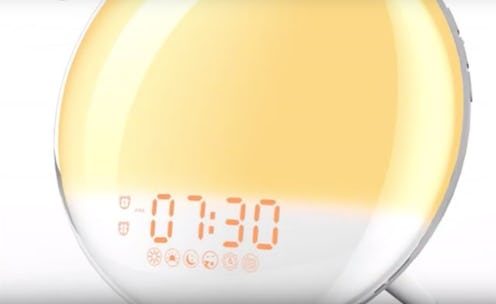The weather is getting cooler and the days are getting shorter, which means you're probably having a hard time getting out of your cozy bed in the morning. The struggle is real. And with Spring Forward coming to a close on Nov. 3, 2019 at 2 a.m. local time, you might need some extra help getting back into your usual schedule. Fear not my friendlies because there's an affordable sun lamp alarm clock you can get for the end of Daylight Saving Time. While it's true that, in most U.S. states, the sun rises earlier in the winter, the colder months are often overcast.
Lack of sun from cloud cover coupled with short days and cold temps can make it difficult to drag yourself out of bed. Dr. Sujay Kansagra, M.D., an associate professor at Duke University Medical Center and Mattress Firm’s resident sleep health expert, tells Bustle that, according to data from a 2014 survey from Mattress Firm, "Americans require an average of three-and-a-half days to adjust to the end of Daylight Saving Time, yet less than half prepare for the change to their sleep schedule," he says. The survey also noted that 82% of people feel tired, groggy, and irritable post time change.
Don't be one of the 82%. Treat yourself to a sunrise alarm clock from Amazon so you'll be ready to face off with Fall Back 2019 like a boss.
The XIRON Light Alarm Clock with Sunrise/Sunset Simulation is a five-star bestseller on Amazon, and has been updated for 2019. Simply set your desired bed and wake-up time, and the alarm will get you ready for sleep at night and gently rouse you from sleep in the morning. In the evening the clock will slowly dim to let you know that it's time for bed. In the morning, the light will gradually increase from 10% to 100%, changing from a gentle red to bright sunlight.
You can choose from 20 levels of brightness, and if you're sharing a bed or a bedroom with someone, you can program the alarm for two separate wake-up times. In addition, you can choose from seven natural alarm sounds, like pianos, birds, waves and more, and seven different colors. The clock also has a charging port for your phone and a radio.
Reviewers praise this sunrise alarm clock for its easy-to-use design, and its ability to get them the hell out of bed. "I have been going through this period of snoozing for over an hour (and not getting up at the time I would like) and so I thought it was time to try something new. This clock is fantastic," one verified reviewer said. "I set it up in under [five] minutes and it got me up and out of bed the next morning in 10 minutes rather than 45 ... it has changed my mornings forever!"
If you've never tried a sunrise simulation alarm clock, a small 2003 study published in the journal BMC Psychiatry found that using a device to simulate dawn (or sunrise) helped improve overall sleep quality after six days of use and continued as long as individuals kept using it. "Simulated dawn appears to be a safe, relatively well-tolerated, and possibly effective means of alleviating sleep disturbances related to the shorter photoperiod during winter," the study noted.
While the results of the study identified the sleep improvement as "modest," anything that can help you get out of bed during the winter months is helpful. What's more, reviewers agree that this alarm clock is easy to use, and one person said that now that they have it they don't know if they could live without it. Apparently, sweet dreams are made of this clock. You could order it today, or put it on your holiday gift wish list. Maybe Santa will bring it for you in December.
Experts:
Dr. Sujay Kansagra, M.D., an associate professor at Duke University Medical Center, program director of the Pediatric Neurology Residency Program, director of the Duke Pediatric Neurology Sleep Medicine Program, and board certified in both child neurology and sleep medicine.
Studies referenced:
Sami Leppämäki, Ybe Meesters, Jari Haukka, Jouko Lönnqvist, Timo Partonen. Effect of simulated dawn on quality of sleep – a community-based trial. BMC Psychiatry. 2003; 3: 14. Published online 2003 Oct 27. doi: 10.1186/1471-244X-3-14
